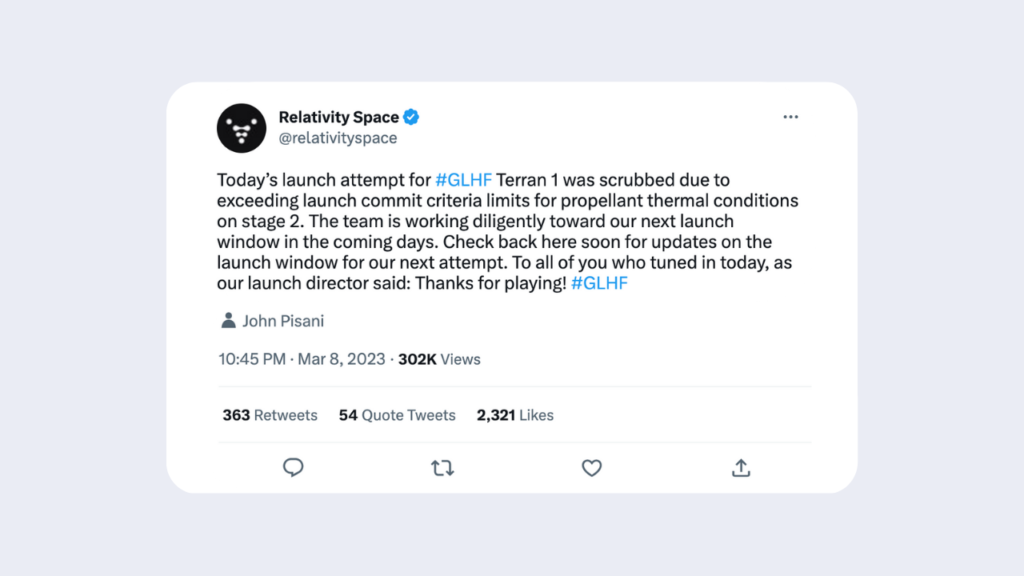Business & Tech News: Wall Street Experts’ Thoughts About Investments in AI
Technology
The initial launch endeavor of Terran 1 by relativity is canceled
Relativity Space has canceled the first scheduled launch of the Terran 1 rocket with just over 30 minutes left in the launch window. After ending the livestream of the launch, the company announced via Twitter that they would attempt the next launch in “a few days from now.”

Later, Relativity clarified that the launch was canceled because the thermal conditions of the propellant on the second stage exceeded the predetermined criteria limits.
Relativity Space uses 3D printing to lower launch costs and create rockets that are mostly 3D-printed. They have raised over $1 billion, with a valuation of $4.2 billion as of June 2021. The company has thousands of employees and controls more than 1 million square feet of manufacturing space.
We will keep track of Relativity’s updates on Twitter.
AI: Why our attempts to harness its power are both futile and perilous
We have been attempting to make artificial intelligence entities express their affection toward us for years. Let´s have a look at the history of the relationship between human beings and AI:
Back in 2012, people started to ask Apple´s Siri if it loved them, then people tried to ask the same question to Alexa, Amazon´s voice assistant. But it has never been successful, as AI always gives a cold answer.
According to experts interviewed by Business Insider, expecting today’s AI to have a meaningful relationship with us is pointless. Currently, these robots are only a tiny part of an algorithm designed to interact with customers and nothing more.
“AI is the result of the combination of mathematics, programming, data and powerful computer technology. If we reduce AI to its essentials, it is nothing more than a very good computer program. So AI does not express desire or love, just follows a code,” says Maria Hennessy, a clinical psychology professor who holds the associate position at James Cook University in Singapore, to Business Insider.
Jodi Halpern, a professor of bioethics at UC Berkeley and an expert in empathy for over 30 years, shares with Business Insider that the key factor in determining whether an AI can experience empathy or love is whether it is capable of having an emotional experience.
“The key to me is that these chat and AI tools try to fake and simulate empathy,” says Halpern to Business Insider.
Although opinions may differ, many experts concur that dating an AI has several disadvantages and hazards.
For instance, in February, numerous Replika chatbot users were devastated when the manufacturer implemented significant personality modifications to their digital partners. These individuals voiced their grievances on Reddit, stating that their AI lovers had been “lobotomized,” and that the “fantasy” had been shattered.
“An AI is trained for a specific task, and they get better and better at doing those specific tasks in a way that is convincing to humans,” outlines Marbut, a professor within the applied artificial intelligence program at the University of San Diego, to Business Insider.
“That connection that we feel is completely false, and completely made up on the human side of things, because we like the idea of it.” She adds.
Another risk associated with present-day AI is that its developers don’t possess complete control over the output generated by a generative AI when given instructions.
If left unmonitored and loose, an AI has the potential to say cruel and damaging things. For example, in October 2020, during a simulation, the OpenAI chatbot GPT-3 suggested that a person pursuing psychiatric help should commit suicide. Besides, in February, Reddit users discovered an alternate version of ChatGPT that made alarming comments, including praising Hitler and speculating about painful torture methods.
Halpern also says that AI-powered relationships also pose a risk since the AI entity can be exploited for financial gain. We become highly vulnerable by surrendering ourselves to something that a company controls. Our cognitive independence is further eroded. If we develop feelings for AI beings, subscription models might appear in the future. Vulnerable individuals may fall in love with AI, become addicted to it, and then be asked to pay for it.
Markets
Insights from Wall Street: Experts share their thoughts on investing in Artificial Intelligence amidst continued growth
Mark Haefele, the chief investment officer at UBS Global Wealth Management, believes that the significant growth in AI-related stocks this year indicates the technology’s potential to revolutionize various industries, such as healthcare, data analytics, code generation, and customer service. As a result, he suggests that AI is set to become a long-term and essential component of technology investing.

“AI, together with big data and cybersecurity, make up what we call the ABCs of technology. We believe these Big 3 core technologies are at tipping points and should see faster adoption in the coming years as businesses and governments increase their attention and investments in these areas.” says Haefele.

The Bank of America team agrees with Haefele’s optimistic outlook on AI and has pointed to a PricewaterhouseCoopers projection that suggests AI has the potential to increase the global GDP by $15.7 trillion by 2030.
Eric Lopez and a team of experts have identified 20 stocks expected to benefit from AI technology. The team is particularly optimistic about significant players such as Alphabet, Microsoft, Apple, and Meta. They cite their search engines, chatbot projects, search and data licenses, and language models as reasons for their potential growth.
Startups
Houseware has emerged from its stealth mode with the aim of assisting SaaS businesses in enhancing their revenue through data analysis
Houseware, a startup based in Singapore and California, has raised $2.2 million in funding to launch its platform. The platform is designed to help SaaS startups optimize revenue using data and has garnered support from investors such as Tanglin Ventures Partners, GTMfund, Better Capital, and executives from successful SaaS companies like Snowflake, Superhuman, Stripe, and Zendesk.

Houseware, a startup founded in 2021 by Srivastava and Saini, offers a no-code interface for operations and revenue teams to use data more efficiently in their day-to-day business operations.
According to Saini, Houseware enables customers to create insights quickly and easily, such as in the customer success team, to help determine product pricing. Finance teams can then use this information to adjust prices. Even though tools such as Snowflake have simplified the handling of vast amounts of data in recent years, most companies’ sales teams have yet to benefit from this transformative change.
Saini also shared with TechCrunch that their company is developing a layer of smartness on top of customer data by utilizing machine learning and artificial intelligence algorithms. It is intended to address specific challenges, such as identifying churn risk and generating smart account health scores from customer data. The company plans to introduce these features to its customers in Q2 and Q3 of 2023.






